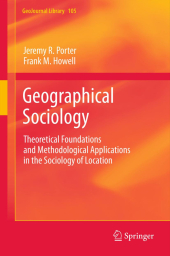 Neuerscheinungen 2014Stand: 2020-02-01 |
Schnellsuche
ISBN/Stichwort/Autor
|
Herderstraße 10
10625 Berlin
Tel.: 030 315 714 16
Fax 030 315 714 14
info@buchspektrum.de |

Frank M. Howell, Jeremy R. Porter
(Beteiligte)
Geographical Sociology
Theoretical Foundations and Methodological Applications in the Sociology of Location
2012. 2014. x, 126 S. 15 SW-Abb.,. 235 mm
Verlag/Jahr: SPRINGER NETHERLANDS; SPRINGER 2014
ISBN: 940079956X (940079956X)
Neue ISBN: 978-9400799561 (9789400799561)
Preis und Lieferzeit: Bitte klicken
Powerful new methods of analyzing social spatial relationships make this exploration of the nexus between spatial theory and sociology a vital addition to the literature that will deepen our understanding of society´s relationship to geographical space.
The discipline of Sociology has a rich history of including spatial context in the analysis of social issues. Much of this history has revolved around the development and application of spatial theory aimed at understanding the geographic distribution of social problems, the organization of communities, and the relationship between society and the environment. More recently, the social sciences have seen a large number of technological innovations that now make it possible to place social behaviour in spatial context. Consequently, because of the historical disjuncture in the development of spatial theory and the recent development of relevant methodological tools, the relationship between materials describing both the methodological approaches and their theoretical importance a scattered throughout various books and articles. Geographical Sociology consolidates these materials into a single accessible source in which spatial concepts such as containment, proximity, adjacency, and others are examined in relation to such methodological tools as hierarchical linear models, point pattern analysis, and spatial regression. As these methods continue to increase in popularity among social scientists the ability to more generally understand societies relationship to geographic space will continue to increase in it importance in the field. This book represents a starting point to linking these concepts to practice and is presented in an accessible form in which students, researchers, and educators can all learn, and in turn, contribute to its development.
Chapter 1: Geo-Sociolog y .- PART I. THE SOCIOLOGY OF LOCATION: THEORETICAL FOUNDATIONS.- Chapter 2: Important Contributions to Geo-Sociology.- Chapter 3: Roots of Space in Sociology Community Sociology at the Wisconsin and Chicago Schools.- Chapter 4: Human Ecology and its Link to Geographical Sociology.- Chapter 5: Contemporary Movements in the Theories of Location.- PART II. SPATIAL CONTEXT IN SOCIAL RESEARCH: METHODOLOGICAL APPLICATIONS.- Chapter 6: Making Data Spatial.- Chapter 7: Spatial Concepts and the Application to Geo-Sociology.- Chapter 8: Geo-Sociology in Practice.- Chapter 9: Concluding Remarks.- Bibliography.


